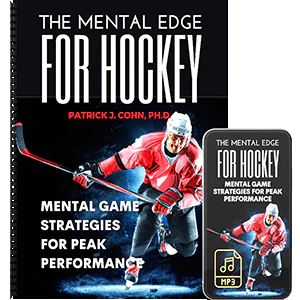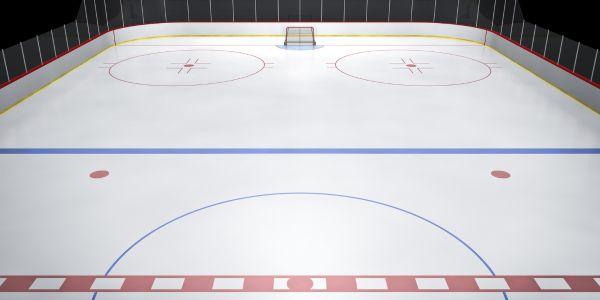Do Rivalry Games Get You Excited or Nervous?
When you play a hockey team, you want to win. When you play a rival, not only do you want to win, but you also want to dominate them.
Many times, there is disdain between rivals, and emotions can run high. If you don’t regulate your emotions, excitement can turn into agitation and nervousness into anxiety.
For example, taking your shift when you are emotionally charged can cause you to be over-aggressive, take unnecessary penalties, force passes, or shoot instead of looking for an open teammate.
If you are anxious and fearful of making mistakes, your reactions on the ice slow down, your muscles become tight, your energy depletes quicker, and you play more reactively on the ice.
You concede an advantage to your rival club when you are over-excited or anxious. Managing your emotions is crucial to playing your best hockey during games.
3 Keys to Managing Your Emotions
- Know the emotions that help you play at your peak and the level of intensity that is beneficial.
- Know specific strategies to calm your nerves and how to focus on performance cues, game strategy, and the keys that contribute to peak performance.
- Learn how to quickly implement emotional regulation and focusing strategies before and during the game and between periods.
One of the most prominent collegiate hockey rivalries is the University of Michigan Wolverines and the Michigan State University Spartans. University of Michigan forward Philippe Lapointe highlighted the importance of staying mentally in control and regulating emotions throughout rivalry games.
LAPOINTE: “There’s a game within the game when it comes to these rivalries. (We want) to not let stuff after the play get in your head, and controlling those type of things are really important.”
In a midseason 2025 matchup, the top-ranked Spartans (19-3-2) beat the No. 10 Michigan hockey team (14-9-1) to split the in-season series.
In the game, the University of Michigan committed 13 penalties and spent 48 minutes in the penalty box, which was the determining factor in the game. Lapointe admitted that emotions got the best of Michigan, but they will reset to prepare themselves better for their next game.
LAPOINTE: “It’s really emotional out there. We don’t like them, and they don’t like us. It’s just going to continue to build on as the series progresses in early February and the playoffs. Just trying to manage those emotions.”
When you play rivalry games, the stakes feel higher. Every small action, shift, shot, and hit seem magnified. This heightened sense of significance can bring out the best and the worst in teams.
On one hand, it can elevate performance, drive focus, and foster team unity. On the other hand, it can lead to reckless decisions, penalties, or moments where emotions boil over.
The team that comes out on top may not be the most physically gifted team but rather the team best equipped to regulate their emotions.
There is more at stake in rivalry games than winning or losing; there’s a sense of pride and bragging rights that accompanies the outcome.
Therefore, regulating your emotions during a highly-charged game is crucial. When you downplay the importance of the game and focus on making the most of each shift, you allow yourself to play more freely and instinctively on the ice.
Related Articles on Hockey Mental Game:
- Focus on What You Can Control to Improve Performance
- Hockey Mindset for Peak Performance
- How Confidence Boosts Performance
*Subscribe to The Sports Psychology Podcast on iTunes
*Subscribe to The Sports Psychology Podcast on Spotify
The Mental Edge for Hockey

The Mental Edge for Hockey teaches you proven and simple mental game strategies so you can overcome fear of failure, lack of confidence, slumps or poor composure, take your practice game to competition, and boost your confidence in hockey. You learn simple, actionable mental game strategies to help you perform at your peak!
I’ve worked with athletes for 30 plus years – and know the top challenges that undermine performance when you perform in games. Now you can tap into my expertise and experience in coaching hockey players on the mental game.
In this program, you’ll learn the TOP 10 mental training lessons for hockey players – the same strategies I teach one-on-one athletes I coach on the mental game. My clients pay thousands of dollars for personal coaching, but now you can have the same strategies to improve your mental game – at a fraction of the price.

Leave a Reply